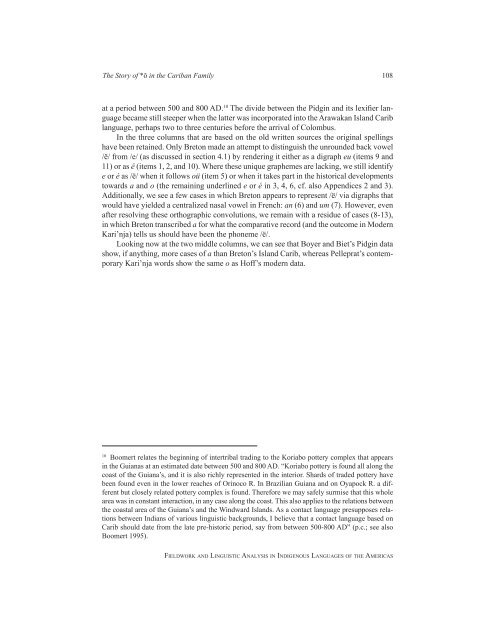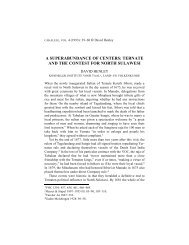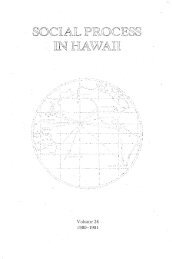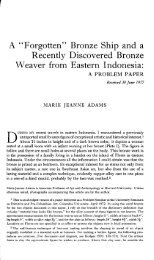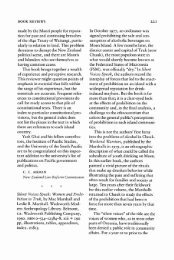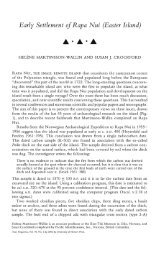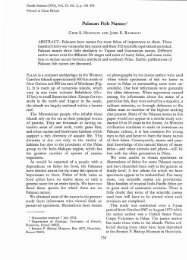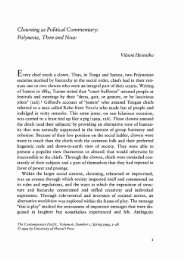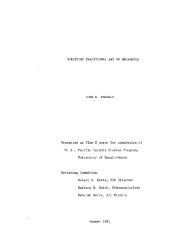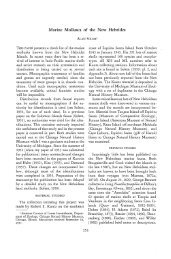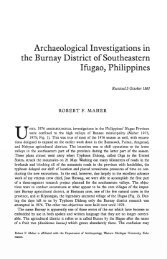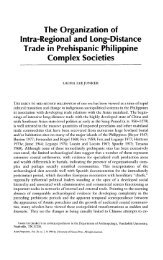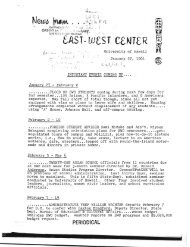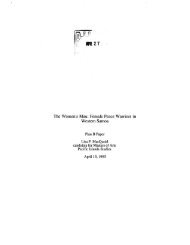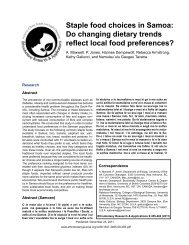Fieldwork and Linguistic Analysis in Indigenous ... - ScholarSpace
Fieldwork and Linguistic Analysis in Indigenous ... - ScholarSpace
Fieldwork and Linguistic Analysis in Indigenous ... - ScholarSpace
Create successful ePaper yourself
Turn your PDF publications into a flip-book with our unique Google optimized e-Paper software.
The Story of *ȏ <strong>in</strong> the Cariban Family 108<br />
at a period between 500 <strong>and</strong> 800 AD. 10 The divide between the Pidg<strong>in</strong> <strong>and</strong> its lexifier language<br />
became still steeper when the latter was <strong>in</strong>corporated <strong>in</strong>to the Arawakan Isl<strong>and</strong> Carib<br />
language, perhaps two to three centuries before the arrival of Colombus.<br />
In the three columns that are based on the old written sources the orig<strong>in</strong>al spell<strong>in</strong>gs<br />
have been reta<strong>in</strong>ed. Only Breton made an attempt to dist<strong>in</strong>guish the unrounded back vowel<br />
/ë/ from /e/ (as discussed <strong>in</strong> section 4.1) by render<strong>in</strong>g it either as a digraph eu (items 9 <strong>and</strong><br />
11) or as ê (items 1, 2, <strong>and</strong> 10). Where these unique graphemes are lack<strong>in</strong>g, we still identify<br />
e or é as /ë/ when it follows oü (item 5) or when it takes part <strong>in</strong> the historical developments<br />
towards a <strong>and</strong> o (the rema<strong>in</strong><strong>in</strong>g underl<strong>in</strong>ed e or é <strong>in</strong> 3, 4, 6, cf. also Appendices 2 <strong>and</strong> 3).<br />
Additionally, we see a few cases <strong>in</strong> which Breton appears to represent /ë/ via digraphs that<br />
would have yielded a centralized nasal vowel <strong>in</strong> French: an (6) <strong>and</strong> um (7). However, even<br />
after resolv<strong>in</strong>g these orthographic convolutions, we rema<strong>in</strong> with a residue of cases (8-13),<br />
<strong>in</strong> which Breton transcribed a for what the comparative record (<strong>and</strong> the outcome <strong>in</strong> Modern<br />
Kari’nja) tells us should have been the phoneme /ë/.<br />
Look<strong>in</strong>g now at the two middle columns, we can see that Boyer <strong>and</strong> Biet’s Pidg<strong>in</strong> data<br />
show, if anyth<strong>in</strong>g, more cases of a than Breton’s Isl<strong>and</strong> Carib, whereas Pelleprat’s contemporary<br />
Kari’nja words show the same o as Hoff’s modern data.<br />
10 Boomert relates the beg<strong>in</strong>n<strong>in</strong>g of <strong>in</strong>tertribal trad<strong>in</strong>g to the Koriabo pottery complex that appears<br />
<strong>in</strong> the Guianas at an estimated date between 500 <strong>and</strong> 800 AD. “Koriabo pottery is found all along the<br />
coast of the Guiana’s, <strong>and</strong> it is also richly represented <strong>in</strong> the <strong>in</strong>terior. Shards of traded pottery have<br />
been found even <strong>in</strong> the lower reaches of Or<strong>in</strong>oco R. In Brazilian Guiana <strong>and</strong> on Oyapock R. a different<br />
but closely related pottery complex is found. Therefore we may safely surmise that this whole<br />
area was <strong>in</strong> constant <strong>in</strong>teraction, <strong>in</strong> any case along the coast. This also applies to the relations between<br />
the coastal area of the Guiana’s <strong>and</strong> the W<strong>in</strong>dward Isl<strong>and</strong>s. As a contact language presupposes relations<br />
between Indians of various l<strong>in</strong>guistic backgrounds, I believe that a contact language based on<br />
Carib should date from the late pre-historic period, say from between 500-800 AD” (p.c.; see also<br />
Boomert 1995).<br />
fieldwork <strong>and</strong> l<strong>in</strong>guistic analysis <strong>in</strong> <strong>in</strong>digenous languages of the americas


